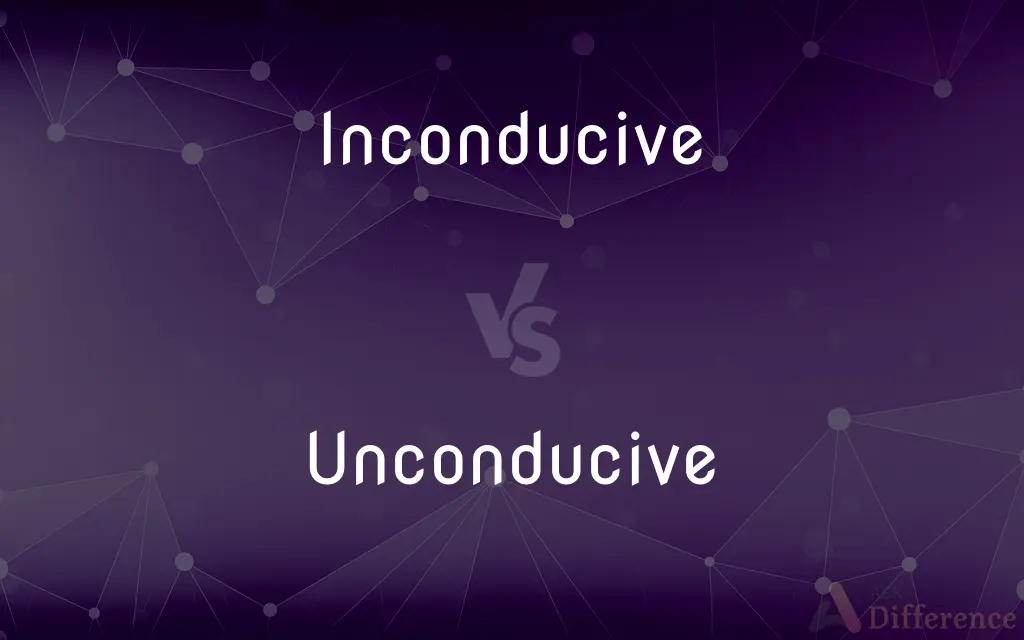Inconducive vs. Unconducive — Which is Correct Spelling?
Edited by Munazza Shafiq — By Fiza Rafique — Updated on April 17, 2024
Inconducive is the incorrect spelling of unconducive. Unconducive means not helpful or supportive.

Table of Contents
Which is correct: Inconducive or Unconducive
How to spell Unconducive?

Inconducive
Incorrect Spelling

Unconducive
Correct Spelling
ADVERTISEMENT
Key Differences
"Unconducive" starts with "un-", a common prefix in English used to indicate negation, like in "unhappy" or "unfair."
Connect "unconducive" with "unhelpful," as both describe something that does not assist or promote a desired outcome.
Think of the adjective "conducive," meaning favorable, and then apply the "un-" prefix to indicate the opposite.
Recall similar constructions where "un-" is used to negate an adjective, such as "unsuccessful" or "uncomfortable."
Remember that "in-" is less frequently used as a negative prefix before 'c', 'un-' is the usual choice in such cases.
ADVERTISEMENT
How Do You Spell Unconducive Correctly?
Incorrect: The noisy environment is inconducive for studying.
Correct: The noisy environment is unconducive for studying.
Incorrect: Such a humid climate is inconducive to the equipment's longevity.
Correct: Such a humid climate is unconducive to the equipment's longevity.
Incorrect: Her critical approach was inconducive to team morale.
Correct: Her critical approach was unconducive to team morale.
Incorrect: The policy changes are inconducive to economic growth.
Correct: The policy changes are unconducive to economic growth.
Incorrect: An overcrowded classroom is inconducive to effective learning.
Correct: An overcrowded classroom is unconducive to effective learning.
Unconducive Definitions
Creating a barrier or hindrance to progress or success.
An unconducive learning environment can demotivate students.
Lacking the qualities or conditions necessary for fostering development or growth.
The soil in the region is unconducive to growing certain types of crops.
Tending to obstruct or prevent a desired effect.
The company's rigid policies were unconducive to innovative ideas.
Not supportive or favorable to the outcomes or circumstances.
The loud music at home was unconducive to her concentration on homework.
Detrimental or disadvantageous to a particular activity or behavior.
His negative attitude was unconducive to teamwork.
Not likely to produce or support some desired outcome.
Unconducive Meaning in a Sentence
Unconducive political climates can impede economic reforms.
The study space was unconducive to focused work due to constant interruptions.
Harsh lighting in the classroom was unconducive to reading.
The unconducive weather forced the event to be postponed.
A lack of resources was unconducive to the project's success.
The team found the meeting room unconducive for creative brainstorming.
She found the office environment unconducive to productivity because of the noise.
Unconducive market conditions led to the closure of the store.
The neighborhood was unconducive to a peaceful lifestyle.
They moved out of the apartment as it was unconducive to their health.
Cold temperatures are unconducive to growing tropical fruits.
Unconducive learning environments can lead to low student engagement.
An unconducive work culture can increase employee turnover.
The hospital's outdated equipment was unconducive to providing efficient care.
An unconducive regulatory environment can stifle business innovation.
The gym's limited hours were unconducive to her schedule.
Crowded classrooms are unconducive to individualized teaching.
A noisy office is unconducive to making important phone calls.
She left the job as it was unconducive to career advancement.
The training provided was unconducive to developing advanced skills.
Night shifts are unconducive to maintaining a healthy work-life balance.
Unconducive economic policies can deter foreign investment.
His uncooperative attitude was unconducive to teamwork.
His management style was unconducive to open communication.
Unconducive soil conditions can lead to poor agricultural yields.
Unconducive Idioms & Phrases
Unconducive atmosphere
An environment that does not support or encourage positive outcomes.
The unconducive atmosphere at work made her decide to resign.
Unconducive to growth
Hindering development or progress.
The lack of investment was unconducive to growth in the region.
Unconducive to success
Not likely to produce or support success.
Their approach was unconducive to success in such a competitive market.
Unconducive to efficiency
Preventing effective or efficient operations or actions.
The outdated processes were unconducive to efficiency.
Unconducive conditions
Circumstances that deter or hinder objectives or activities.
The unconducive conditions at the campsite dampened their spirits.
Unconducive to fairness
Not supporting or promoting fairness.
The biased rules were unconducive to fairness in the competition.
Unconducive to relaxation
Not allowing relaxation or leisure.
The noisy hotel room was unconducive to relaxation.
Unconducive to innovation
Not encouraging or supporting innovative ideas or methods.
The strict company policies were unconducive to innovation.
Unconducive environment
A setting that does not facilitate or support desired actions or states.
The unconducive environment in the company stifled creativity.
Unconducive to learning
Not favorable or suitable for acquiring knowledge or skills.
The disruptive classroom was unconducive to learning.
Unconducive to peace
Not promoting or supporting peaceful conditions.
The ongoing disputes were unconducive to peace in the area.
Unconducive to partnership
Not conducive to forming or maintaining partnerships.
Their differing goals were unconducive to partnership.
Unconducive to health
Detrimental or harmful to physical or mental health.
The polluted air was unconducive to health.
Unconducive to happiness
Not promoting or supporting happiness.
His pessimistic outlook was unconducive to happiness.
Unconducive to discussion
Not favorable for open and constructive discussions.
The tense meeting was unconducive to discussion.
Unconducive to cooperation
Not supportive of or likely to encourage cooperation.
The team leader's attitude was unconducive to cooperation.
Unconducive to progress
Hindering advancement or development.
The outdated technology was unconducive to progress.
Unconducive to change
Resistant to or discouraging change.
The organization's culture was unconducive to change.
Unconducive to resolution
Not aiding in resolving issues or conflicts.
The lack of communication was unconducive to resolution.
Unconducive to teamwork
Not supporting or facilitating teamwork.
His competitive nature was unconducive to teamwork.
Common Curiosities
How do we divide unconducive into syllables?
Unconducive is divided into syllables as follows: un-con-du-cive.
How is unconducive used in a sentence?
Unconducive is used as an adjective to describe situations, environments, or conditions that are not favorable or helpful.
What is a stressed syllable in unconducive?
The stressed syllable in unconducive is the second syllable: con.
Why is it called unconducive?
It is called unconducive because it describes conditions that are not conducive, meaning they do not support or promote a favorable outcome.
How many syllables are in unconducive?
Unconducive has four syllables.
What is the root word of unconducive?
The root word of unconducive is "conducive."
What is another term for unconducive?
Another term for unconducive is "detrimental" or "unhelpful."
What is the plural form of unconducive?
Unconducive, as an adjective, does not have a plural form.
Is unconducive a noun or adjective?
Unconducive is an adjective.
Is unconducive an adverb?
No, unconducive is not an adverb; it is an adjective.
Is unconducive an abstract noun?
No, unconducive is an adjective, not a noun.
What is the verb form of unconducive?
Unconducive does not have a verb form; it is strictly an adjective.
What is the pronunciation of unconducive?
Unconducive is pronounced as /ʌnkənˈdjuːsɪv/.
Is unconducive a vowel or consonant?
The word "unconducive" starts with a vowel sound.
Is unconducive a countable noun?
Unconducive is not a noun; it is an adjective and does not have a countable form.
Is unconducive a collective noun?
No, unconducive is an adjective, not a noun.
Is the unconducive term a metaphor?
No, the term unconducive is not a metaphor; it directly describes conditions that are not favorable.
Which determiner is used with unconducive?
Determiners like "the" or "a" are typically used with unconducive, depending on the context.
Which vowel is used before unconducive?
Typically, the article "an" is used before unconducive because it starts with a vowel sound.
What is the opposite of unconducive?
The opposite of unconducive is "conducive."
Is unconducive a negative or positive word?
Unconducive is a negative word, indicating something that does not support or contribute positively.
Which preposition is used with unconducive?
Common prepositions used with unconducive include "to" and "for," depending on the context.
Is the word unconducive imperative?
No, unconducive is not imperative; it is an adjective.
Is the word unconducive Gerund?
No, unconducive is not a gerund; it is an adjective.
Is the word “unconducive” a Direct object or an Indirect object?
Unconducive, being an adjective, cannot be a direct or indirect object.
What part of speech is unconducive?
Unconducive is an adjective.
What is the singular form of unconducive?
Unconducive is an adjective and does not have a singular or plural form; it modifies nouns.
Which conjunction is used with unconducive?
Conjunctions like "and" or "but" may be used with unconducive, depending on the sentence structure.
Which article is used with unconducive?
The definite article "the" or the indefinite "an" can be used with unconducive, depending on whether it refers to a specific instance or a general condition.
Share Your Discovery

Previous Comparison
Ingredient vs. Ingredience
Next Comparison
Alums vs. AlumniAuthor Spotlight
Written by
Fiza RafiqueFiza Rafique is a skilled content writer at AskDifference.com, where she meticulously refines and enhances written pieces. Drawing from her vast editorial expertise, Fiza ensures clarity, accuracy, and precision in every article. Passionate about language, she continually seeks to elevate the quality of content for readers worldwide.
Edited by
Munazza Shafiq













































